| Construction Rating: | starstarstarstar_borderstar_border |
| Flight Rating: | starstarstar_borderstar_borderstar_border |
| Overall Rating: | starstarstarstar_borderstar_border |
| Diameter: | 0.98 inches |
| Length: | 19.00 inches |
| Manufacturer: | Estes  |
| Skill Level: | 2 |
| Style: | Scale |
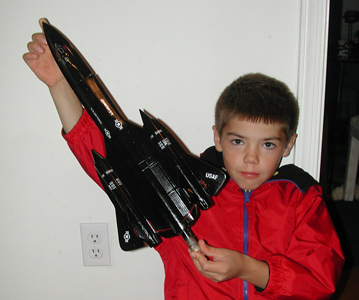 Brief:
Brief:
This is the Sport Scale SR-71 Blackbird Model Rocket. It is an 18mm motor with parachute recovery Estes challenge kit. The SR-71 was designed at the famous "Skunk Works" with a mission of high alititude reconnaissance!
Construction:
The Blackbird kit comes in a box with a color picture of the built kit on the outside. I built kit number EST-7003. It is labeled as a "Challenge" kit series with a skill level three. Inside the box you will find three body tubes, a plastic nose cone, two plastic tail/inlet cones and one die-crunched balsa sheet. Also included are two green centering rings, engine mount tube, engine hook, one launch lug, die-cut paper patterns for the wing and jigs, a parachute kit, some shock cord and a rectangle of water slide decals. Two sheets of folded paper instructions are included in the kit box with 26 step by step instructions on 8 pages. The instructions are good and easy to follow. There is even a decal placement chart. This kit was given to me by a friend of a friend so I don't know how old it is, but the box says "made in the US" so it must be vintage!
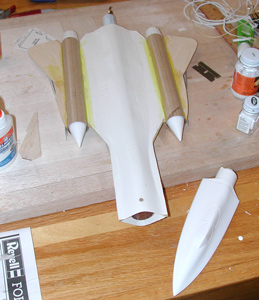 To build the curved fuselage of the SR-71 Estes uses a body tube with two long fins glued to the sides. You must first glue the fin sections together then glue the fins to the sides of the main body tube. The kit provides two cardstock "jigs" to lay the fins on while they are drying in order to keep them aligned. The jigs are used again on the outer fins to keep them level with the inner "wings". I used aliphatic resin ( carpenters yellow glue). I put a bead of glue on the fin, let it sit for a minute to thicken. While holding the fins in place for another couple of minutes, I aligned the fins with the triangular wing jig.
To build the curved fuselage of the SR-71 Estes uses a body tube with two long fins glued to the sides. You must first glue the fin sections together then glue the fins to the sides of the main body tube. The kit provides two cardstock "jigs" to lay the fins on while they are drying in order to keep them aligned. The jigs are used again on the outer fins to keep them level with the inner "wings". I used aliphatic resin ( carpenters yellow glue). I put a bead of glue on the fin, let it sit for a minute to thicken. While holding the fins in place for another couple of minutes, I aligned the fins with the triangular wing jig.
Finishing:
The wing alignment is rather "fiddley". I was skeptical of its effectiveness but if you have a nice flat table and you are careful with the wing jigs it works fine. The fins came out pretty straight.
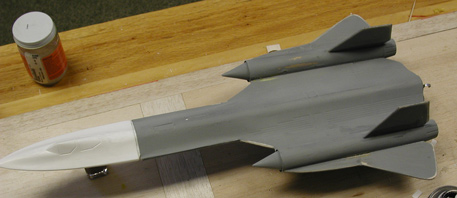 The trick in this kit is the center paper fuselage overlay. There is a top and a separate bottom piece. The paper is almost impossible to line up exactly with the balsa fins. Partly because of the poor quality of the die cutting on the balsa. You can use small black spring type paper clips to hold the paper around the edge of the balsa fins. Glue the paper in steps, as per the instructions and take your time, it actually works!
The trick in this kit is the center paper fuselage overlay. There is a top and a separate bottom piece. The paper is almost impossible to line up exactly with the balsa fins. Partly because of the poor quality of the die cutting on the balsa. You can use small black spring type paper clips to hold the paper around the edge of the balsa fins. Glue the paper in steps, as per the instructions and take your time, it actually works!
You could scratch build this kit. You would just have to cut out your own paper pattern for the center fuselage piece. The flat arrow head nose cone would present a carving challenge however.
There are angled card stock fin templates for the top fins with the bottom fins being a different template. The top fins angle in and the lower fins angle outward as per prototype. The die-cut fins required some filler on the ends where the die-cut machine smashed them and the water slide decals weren't very sticky. Perhaps they were just old. They went on nicely but came off after just one night of drying!
Construction Rating: 3 out of 5
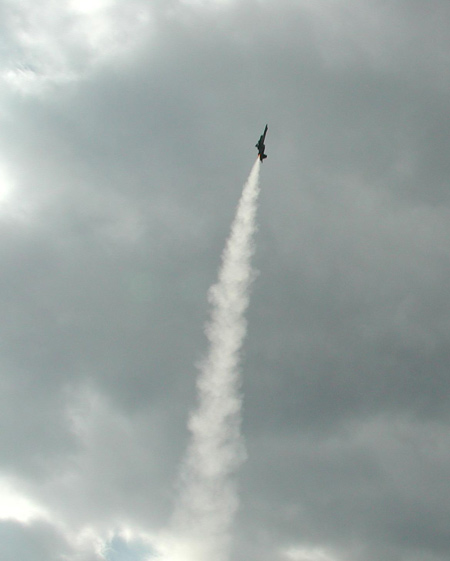 Flight:
Flight:
The recommendced motors are B4-2, B6-2, B6-4 and C6-5. Considering that the box cover weight shown is 3.2 oz. I don't know where they came up with this number, this thing is heavy! Ours came in at 4.1+ . The instructions tell the builder to add ALL of the provided clay in the nose cone. So I did the very first launch with a C6 engine. As far as launching, the model is very conventional and it does requrie recovery wadding. The motor retention is standard Estes wire clip.
The Blackbird looks awsome when finished. In addition it is a somewhat unusual rocket to bring out to the launch pad.
The first flight was loaded with an Estes 18mm C6-3 and four sheets of blue recovery wadding. The ignition and liftoff were fine but at an altitude of 50 feet the rocket veered badly down wind and continued up in a smokey angled climb. The ejection charged fired normally and the flight was a success. We were worried that the parachute might be a little small for such a heavy rocket but it worked fine all three times with no damage to the rocket.
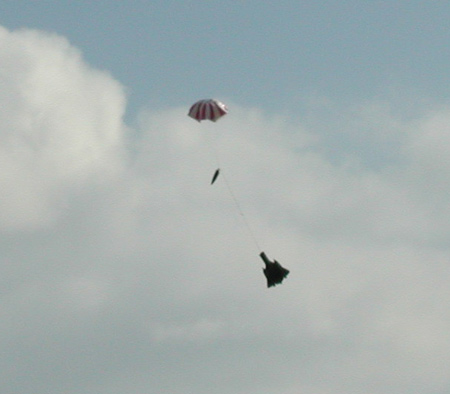 Recovery:
Recovery:
Recovery is via parachute and shock cord. The provided shock cord is way too short, so we added 18 inches of some after market shock cord. It was gluded in via the three fold card stock method, just like any other rocket kit. The recovery parachute is good. The included plastic parachute seemed a bit small but it turned out to work fine for this rocket at 4.1 oz.
The second test launch utilized a Quest B6-4. We taped the motor casing with some scotch tape to make up for the smaller diameter. With less power, the Blackbird flew straighter for some reason! This was a great flight with perfect ejection. The next flight on another Estes C6-5 arched over again and the ejection charge burned the parachute a little and the heavy nose cone made a small dent on the top of the fuselage.
Flight Rating: 2 out of 5
Summary:
The SR-71 kit by Estes is a challenge kit. It takes several days to build, because you have to wait for the glue really to dry on one operation in order to proceed to the next step. The die-cut balsa fins would be much better if they were laser cut. As they were, it took some re-sanding, filling and fitting to get them to fit properly. The plastic parts supplied look nice and fit perfectly.
I believe the decals were just old, some of them did not stick well at all. Overall the rocket looks good, it was fun to build. The kit instructions directed the builder to put all of the supplied clay in the nose cone. I'm not sure this helped the stability as it was intended.
Overall Rating: 3 out of 5
Other:
The wing jigs supplied in the kit look flimsy and using them is "fiddley" but they do work. We will need to do a center of pressure study on the model to see if we can improve the stability during boost. We might experiment with removing some of the nose clay.
Other Reviews
- Estes SR-71 Blackbird By Jon Revelle
This is a scale model of the world's fastest jet. Estes brought it back in 2003 along with some other military rocket kits. This one was the original vintage version that was given to me by my neighbor. He said he built it sometime in the 1970s, it was missing fins, and in need of a parachute. The newer ones come in a bag with: 1 BT-50 body tube 2 shorter BT-50 body tubes 1 nose ...
- Estes SR-71 Blackbird By Eric Miller
This is a model of the United Stated Airforce 1962 spy reconnaissance plane. Still the fastest and highest flying plane in the world. When I opened the box I was mesmerized at all the pieces to the blackbird and a few I never used before. This is a Estes Challenger level kit. An appropriate classification since it was. This kit can be built with a ruler, hobby knife and white or yellow glue. ...
- Estes SR-71 Blackbird By Paul Altman
Estes - SR-71 Blackbird ( Contributed - by Paul Altman) The SR-71 comes boxed like most Estes Challenger series kits. It is a level 3 and they aren't kidding but well worth the time. First thing you should do is look at the directions very carefully and note the pictures. Very important for the nose cone to fit well. I personally did not like the way you glue the fins together in ...
 |
 |
Flights
 |
 |
C.S (April 1, 2001)
L.Z. (July 1, 2001)
R.F. (July 1, 2001)
M.K. (July 1, 2001)
G.M.K. (November 24, 2005)
Sponsored Ads
 |
 |












D.S. (January 1, 2001)